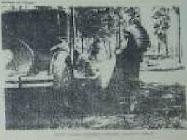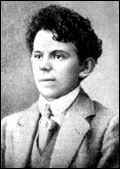This is quoted by Nadezhda Mandelstam in an important chapter in Hope Against Hope, titled "The Earth and its Concerns". About Acmeism & Symbolism, & the philosophical currents in early 20th-cent. Russia which underlay these literary attitudes or movements. Mandelstam &/vs. the thinker Berdiayev...
Here she also quotes her husband : "Thanks to the wonderful bounty of Christianity, the whole of our two-thousand-year-old culture is the setting of the world free for play, for spiritual pleasure, for the free imitation of Christ." She emphasizes M.'s attitude as the "grateful guest" :
"In his essay 'The Morning of Acmeism' he tried to give poetic justification for remaining attached to earth with its three dimensions : 'The earth is not an encumbrance or an unfortunate accident, but a God-given palace.' This is followed by a polemical passage about people who, like Berdiayev, cannot wait to get to a better world and regard life on earth as being literally God-forsaken. In the same essay, which was a kind of manifesto, he asked : 'What would you think of a guest who, while living at the expense of his host and enjoying his hospitality, actually despises him in his heart of hearts and thinks only of ways to outsmart him?' 'Outsmart' here means to escape from time and three-dimensional space. To M., as a self-styled Acmeist, three-dimensional space and life on earth were essential because he wanted to do his duty by his 'host' - he felt he was here to build, which can only be done in three dimensions. This explains his attitude toward the world of things. In his view, the world was not hostile to the poet or - as he put it - the builder, because things are there to be built from. Stone - the title of M.'s first published collection of poems [and mine] - is a building material which 'seems to crave for another mode of being' and longs to find its place in 'a vaulted nave' and thus joyfully interact with others of its kind. M. never talked of 'creating' things but only of 'building' them." [p. 266]
This passage and others like it had a very formative influence on me back in the 1970s. Imagine their effect on someone whose maternal grandfather built grain elevators and docks and other giant structures around the upper midwest; whose paternal great-grandfather arrived in Minneapolis in the 1870s on a steamboat, when the town was young, and set about building houses...
Here's a simple (beginner's) poem from my own first book, Stone (Copper Beech Press, 1979).
ARMENIA
to N.M.
Under the mountain's weight,
the snow, the roaring waterfalls,
cold heights where the earth
stretches herself under clouds -
under the weight of mountains,
the dead weight of decaying soil
turns coal dust into diamonds.
Stone is clumsy, and groans -
red earth crushes the blind,
stones long to leap in the archway.
A willow-tree stands by the river
and sighs; the warm season rolls away
over flat water, the mirror of dusk.
In the shadow of the furrowed hills,
brick towers, open wounds and streets,
an echo floats in the falling air,
a birdsong stifled in the ribcage.
Belly and tongue have sealed a pact,
loins and heart have been enticed,
the whole city trembles; blind feet
drum the earth for their very lives.
And a woman wearing a veil of memories
draws from the pebbles her ancient signs:
feathers, broken shells, and sky.



No comments:
Post a Comment